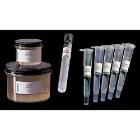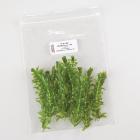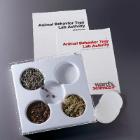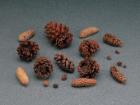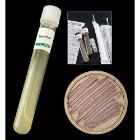You Searched For:
420 results were found
Reading
Catalog Number:
(470189-274)
Description:
Ceratophyllum
Catalog Number:
(470179-802)
Description:
Freshwater. Unicellular; triangular desmid. Basic culture solution. Characterized by green plastids and cell walls composed of cellulose.
Description:
An excellent aquarium oxygenator, Elodea densa is great for teaching plant respiration, photosynthesis, and plasmolysis.
Catalog Number:
(470190-600)
Description:
Which environment is more appealing?
Catalog Number:
(470092-310)
Description:
Cone, Conifer, Set/18 (6-spruce, 6-cedar, 6-Pine)
Catalog Number:
(470179-092)
Description:
From soil and water rich in minerals. Organism of putrefaction.
Catalog Number:
(470179-200)
Description:
This organism is normally isolated from soil and is a non-pathogenic strain of the mycobacterium genus.
Catalog Number:
(470179-098)
Description:
Colorless, most widely dispersed of the Serratia species.
Catalog Number:
(470179-636)
Description:
Candida albicans
Description:
Isolated from sewage, human intestines, and urinary tract infections. Spreading colonies are seen on agar growth medium.
Description:
Grows on dead tissues. Novobiocin resistant (S. epidermidis and S. aureus novobiocin sensitive).
Catalog Number:
(470176-388)
Description:
Penicillium chrysogenum
Description:
Noted for capsular swelling. Causes pneumonia and urinary tract infections.
Description:
This organism can be isolated from soil, wounds, and intestinal tracts of humans. It digests protein and is known for its strong, distinctive odor.
Catalog Number:
(470179-178)
Description:
Isolated from human saliva, sputum, and intestine. No Lancefield group shown, alpha hemolysis.
Description:
Both of these strains of Serratia marcescens are colorless mutants when plated alone, but when grown together, they produce a red pigment.
Inquire for Price
Stock for this item is limited, but may be available in a warehouse close to you. Please make sure that you are logged in to the site so that available stock can be displayed. If the
Stock for this item is limited, but may be available in a warehouse close to you. Please make sure that you are logged in to the site so that available stock can be displayed. If the
This product is marked as restricted and can only be purchased by approved Shipping Accounts. To apply for a shipping account number, click here. If you need further assistance, call Customer Service at 800-962-2660 or email [email protected].
-Additional Documentation May be needed to purchase this item. A VWR representative will contact you if needed.
This product has been blocked by your organization. Please contact your purchasing department for more information.
The original product is no longer available. The replacement shown is available.
Limited quantities of this product are available. To check availability or place an order, call Customer Service at 800-962-2660 or email [email protected].
|
|||||||||






